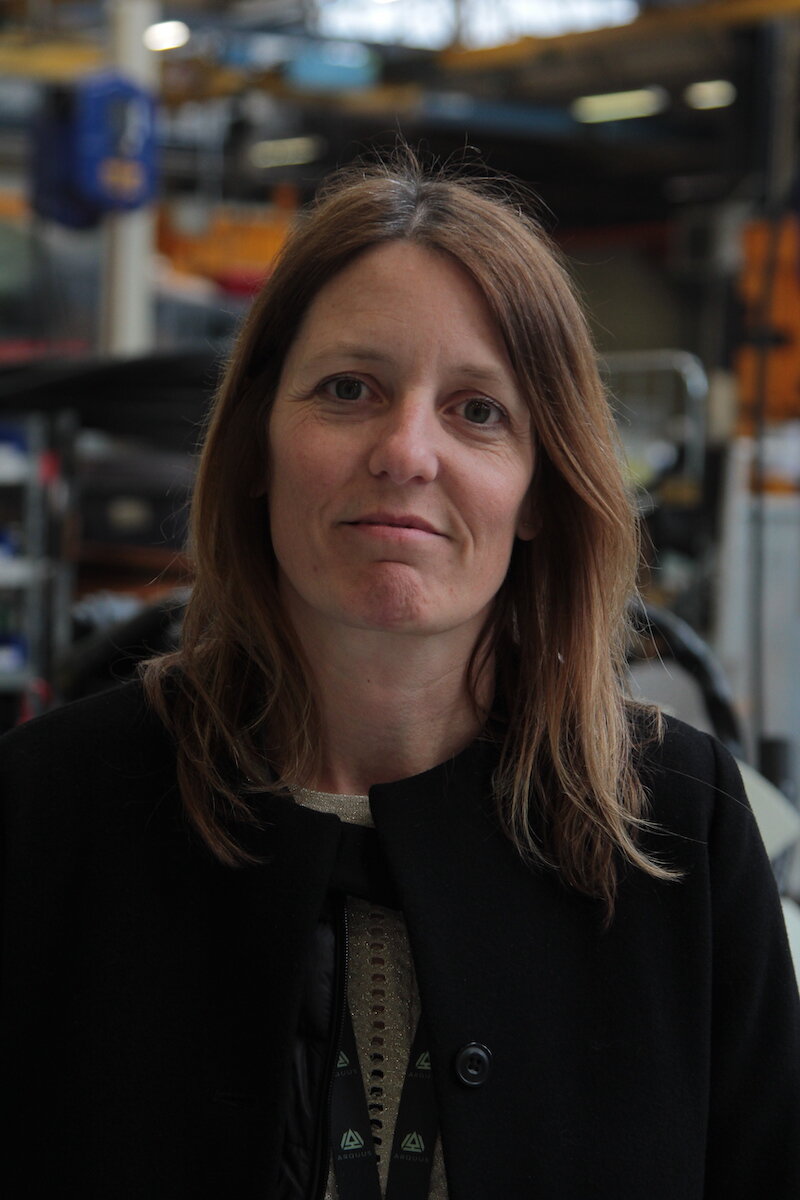Sophie Rol
Sophie Rol, photo credit: Christina Mackenzie
Sophie is the production line manager and number two in the pecking order at the Arquus factory in Limoges, which manufactures armoured vehicles for the French army and for export. “Every month we have production targets to meet and it's my responsibility to make sure that happens,” she says. It's a factory floor job and she likes it that way. Her office is right in the middle of the floor so that "I can keep an eye on the production line."
As she shows me around, this wiry young woman in her security shoes "so comfortable I sometimes accidentally forget to take them off before going home," talks about gear boxes and kinetic production lines and axle assemblies. "I'm afraid I'm no mechanic" I apologise to which she cheerfully retorts "neither am I, but I've learnt a lot of things" in the 17 years since joining the company.
Like many youngsters Sophie had no idea what she wanted to do when she left school. So, like many, she opted for law school "without much conviction," she admits. So little conviction, in fact, that she dropped out after two years. "I spent the next four or five years doing odd jobs: cashier in a supermarket, waitressing in a fast-food outlet. I had a flat, a nice bunch of friends but after a while I realised that I really didn't want to spend the rest of my life odd-jobbing."
So she contacted a training agency. It happened to need a quality technician itself so offered her an apprenticeship. "I'd never heard of quality technicians and so had no idea what it entailed but I found that even with my literary baccalaureate I could easily understand the lessons, a lot of which centred on norms and standards. It was all very professional with internships not only at the training agency but with other companies too," she explains.
Two years later she was a professionally qualified quality technician and was given a full-time permanent contract at the agency.
““At school nobody ever mentions careers in industry, and yet it’s passionately interesting””
So what does a quality technician actually do? I ask. "It's applying a methodology to eradicate a problem at source," she explains. "Rather than just fixing the thing that's wrong, such as an illegible reference number on a part, we look at why it's illegible and we may discover that the part is not being correctly fed into the stamping machine so we find a solution to that, the actual source of the problem."
But meanwhile she'd married and her civil service husband was posted to Paris so she resigned and found a job in the capital with the French norms and standards certification institute, AFAQ. "And then we learned that my husband's department would be permanently moved to Limoges so I started looking for a job there and found one, before we'd even moved as a family, as a quality technician with Renault Trucks Defense [the defence arm of Sweden's Volvo AB that is now called Arquus] working on the VAB armoured vanguard vehicle."
"I'd never seen a military vehicle in my life before and I'd never worked in industry! But I liked this job straight away," she grins. The job was to provide documented proof to the client, the DGA French military procurement agency, that the quality of the vehicles met the French army's stringent requirements. "At school nobody ever mentions careers in industry, and yet it's passionately interesting," she muses, a subject she returns to several times during our conversation.
Being a woman in a heavily male-dominated industry does not bother her. "I was made to feel welcome and, to be honest, it's sometimes an advantage to be a woman in a man's world because one is noticed." And indeed, I do notice the only other woman on the production line. “She works at mounting the fenders and wiring,” Sophie says.
By 2010 she'd been promoted to quality manager and four years later, aged 37, suddenly felt that her education was no longer aligned with her professional position. So she validated academic credits via acquired professional experience which enabled her, without an undergraduate degree, to study for a Master's degree in quality, security and the environment at the Kedge business school in Bordeaux. "I enjoy small challenges like that," she says, smiling broadly, adding that “it was a personal decision so that my education equalled my industrial experience.”
She juggled her studies, her work and raising two young sons “thanks to help from my husband,” she notes.
One of her most satisfying professional experiences was in 2016 when she was put in charge of a “war room” (set up to meet an urgent requirement for trucks from the French Army) with people from the design office, purchasing, methods, and logistics. “All people with whom I usually only have telephone contact, so to be in the same room, working hand in hand, was a very rich, very intense professional experience,” she says.




